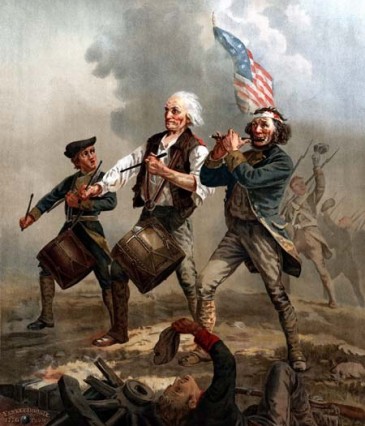Introduction
The song “Yankee Doodle” is thought to have originated during the French and Indian War (1754–63), but it became particularly popular during the American Revolutionary War. It was first sung by British officers as a way of mocking the colonial “Yankees,” a name commonly used for all Americans. “Doodle,” from the German dudel or dödel, means “fool” or “simpleton;” the “cap”—called “macaroni”—referred to the wig, fashionable among the Yankees in the 1770s but regarded as foppish or effeminate by the British. However, after turning the British back at the Battles of Lexington and Concord, where they were vastly outnumbered, the Americans adopted the song as a source of pride. And so it has remained.
The lyrics have been attributed to Doctor Richard Shuckbergh, a British Army surgeon, who penned them to describe the to-him-foolish appearance of the Colonial troops under Colonel Thomas Fitch V, son of the then-Connecticut governor. The tune is thought to come from a nursery rhyme.
Describe the tone of both the tune and the lyrics of the song. Can you explain why it has so long been associated with the martial spirit? Do you understand why it has been—and continues to be—regarded as patriotic? For a musical rendition, view this video performance of the song.
Yankee Doodle went to town
A-riding on a pony,
Stuck a feather in his cap
And called it macaroni.
(Chorus)
Yankee Doodle keep it up,
Yankee Doodle dandy,
Mind the music and the step,
And with the girls be handy.
Father and I went down to camp
Along with Captain Gooding,
And there we saw the men and boys
As thick as hasty pudding.
(Chorus)
And there we see a thousand men
As rich as ’Squire David,
And what they wasted every day,
I wish it could be saved.
(Chorus)
The lasses they eat it every day,
Would keep a house a winter;
They have so much that I’ll be bound,
They eat it when they’re a mind to.
(Chorus)
And there we see a swamping gun
Big as a log of maple,
Upon a deuced little cart,
A load for Father’s cattle.
(Chorus)
And every time they shoot it off,
It takes a horn of powder,
And makes a noise like Father’s gun,
Only a nation louder.
(Chorus)
I went as nigh to one myself
As ’Siah’s inderpinning;
And Father went as nigh again—
I thought the deuce was in him.
(Chorus)
Cousin Simon grew so bold
I thought he would have cocked it;
It scared me so I shrinked it off
And hung by Father’s pocket.
(Chorus)
And Captain Davis had a gun,
He kind of clapt his hand on’t,
And stuck a crooked stabbing iron
Upon the little end on’t
(Chorus)
And there I see a pumpkin shell
As big as Mother’s bas[i]n,
And every time they touched it off
They scampered like the nation.
(Chorus)
I see a little barrel too,
The heads were made of leather;
They knocked upon’t with little clubs,
And called the folks together.
(Chorus)
And there was Captain Washington,
And gentle folks about him.
They say he’s grown so ’tarnal proud
He will not ride without ’em.
(Chorus)
He got him on his meeting clothes,
Upon a slapping stallion.
He sat the world along in rows,
In hundreds and in millions.
(Chorus)
The flaming ribbons in his hat,
They looked so tearing fine ah,
I wanted dreadfully to get
To give to my Jemima.
(Chorus)
I see another snarl of men
A-digging graves, they told me,
So ’tarnal long, so ’tarnal deep,
They ’tended they should hold me—
(Chorus)
It scared me so I hooked it off,
Nor stopt, as I remember,
Nor turned about till I got home,
Locked up in Mother’s chamber.
(Chorus)
Return to The Meaning of Independence Day.



Post a Comment